Heathcote Community Hosts Baltimore Racial Justice Action
Forwarding press release—WT:
Achieving Racial Equity in Our Communities and Beyond
Have you heard the phrase “white privilege?” Why are people talking about it? What is it? Who has it? What can we do with it? How can we be sure that what we are trying to achieve will not maintain unequal patterns and disparities in outcomes? If you are interested in these topics but are afraid to explore them for fear of being misunderstood or “called out;” if you are struggling with your own baggage around these issues or want to increase your understanding of and effectiveness in diverse environments; if you’re working on grass-roots organizing, working with community organizations, just your own family, or want to organize your own anti-racism community, come join us. In this workshop we will view the video, Mirrors of Privilege: Making Whiteness Visible and engage in a facilitated, safe but frank discussion of contemporary race-related issues.
No matter where you are in your journey, BRJA provides a supportive, non-judgmental community of trainers/facilitators.
All are welcome to join us.
Suggested donation: $5 – $20.
Friday, May 13th
6:00 – 9:00 pm
HEATHCOTE COMMUNITY
21300 Heathcote Road
Freeland, MD 21053
Please join our Hippie Chick Diaries fan page on Facebook!
Subscribe to this blog's RSS feed
Graffiti: The Subversive’s Hymnal in the Age of Earth, Inc.
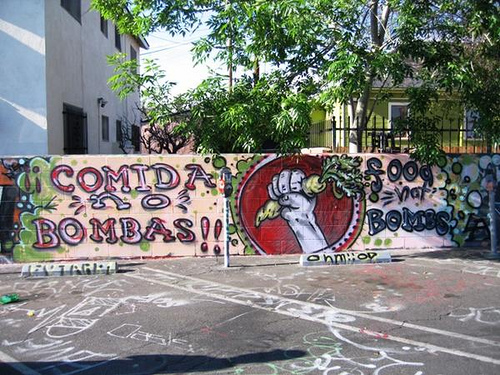 Although many of us in the Intentional Communities movement know C.T. Butler as a consensus trainer/ facilitator/mediator and the author of On Conflict and Consensus and Consensus for Cities, he is also the fountainhead and co-founder of the original Food Not Bombs collective. He’s co-author of Food Not Bombs: How to Feed the Hungry and Build Community, with FNB co-founder Keith McHenry.
Although many of us in the Intentional Communities movement know C.T. Butler as a consensus trainer/ facilitator/mediator and the author of On Conflict and Consensus and Consensus for Cities, he is also the fountainhead and co-founder of the original Food Not Bombs collective. He’s co-author of Food Not Bombs: How to Feed the Hungry and Build Community, with FNB co-founder Keith McHenry.
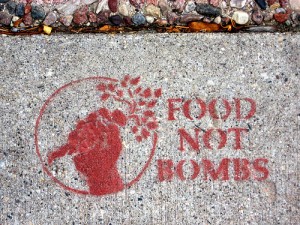 In his role as consensus trainer, he met Douglas Rori in Nairobi, Kenya. Both were attending the IndyMedia Convergence leading up to the World Social Forum there four years ago. They’ve stayed in touch and C.T. has closely supported Doug’s work in establishing a FNB chapter in Kenya. So when Doug posted his new film on facebook recently, I was electrified by the parallels of the use of graffiti in Africa with the stories C.T. has told me about graffiti as a central artistic tool in FNB and his other activism in the 1980’s. Of course, the artistic bar has been shot into the stratosphere, as depicted in the thought provoking documentary Exit Through the Gift Shop. And the art in Doug’s film is of that caliber.
In his role as consensus trainer, he met Douglas Rori in Nairobi, Kenya. Both were attending the IndyMedia Convergence leading up to the World Social Forum there four years ago. They’ve stayed in touch and C.T. has closely supported Doug’s work in establishing a FNB chapter in Kenya. So when Doug posted his new film on facebook recently, I was electrified by the parallels of the use of graffiti in Africa with the stories C.T. has told me about graffiti as a central artistic tool in FNB and his other activism in the 1980’s. Of course, the artistic bar has been shot into the stratosphere, as depicted in the thought provoking documentary Exit Through the Gift Shop. And the art in Doug’s film is of that caliber.
I want to share Doug’s link because, wherever activists are working, I love the power of delivering our messages on our own terms. This seems more and more important as we find ourselves living on Earth, Inc.
http://vimeo.com/20684850
Please join our Hippie Chick Diaries fan page on Facebook!
A Global Open Space Geared Towards Action
From Wren: The World Social Forum is a growing event that happens concurrently with The World Economic Forum. WSF intends to turn the tide of “neo-liberal globalization,” (free market capitalism, with slavery, child labor, imperialism and environmental injustice).
I just received this email reporting on the World Social Forum in Dakar, Senegal. Click here for extensive photo coverage.
C.T. Butler and I had planned to attend it and the preceding IndyMedia Convergence as consensus trainers, but our invitation was relatively last minute and funding didn’t happen in the short time. We’re expecting our friends to return in the next few days with exciting stories! Until then I share this, unedited:
—WT
From Sven Giegold—
Just like last year’s World Social Forum held in Belem (Brazil), the
Forum in Dakar took place under the impression of the deep crisis of
neoliberal globalization. Whereas the economy has recovered for some
time already in some regions of the world, it started to do so recently
in others. But all that cannot hide the existence of deep social,
economic and ecological problems. The WSF provided a meeting point for
a broad range of individuals originating in movements and civil society
who hope to overcome neoliberal globalization: Either by establishing
social and ecological regulations, for instance by implementing a
“Green New Deal”, or by breaking with capitalism in general. This range
of political alternatives characterized this WSF, just as the
alterglobalist movement in general. In the run up to Dakar, Gustave
Massiah (2011a & 2011b)* wrote a widely acknowledged book and published
12 theses on the alterglobalist movement.
Whereas the debate in Belem had been dominated by discussions over the
crisis of civilization and fundamental alternatives to globalized
capitalism, such as the concept of “buen vivir” (“good living”) this
was different in Dakar. This year, the agenda was dominated by the
peaceful revolutions in Egypt and Tunisia, and the particular African
context with its own topics. Already the impressive opening march made
clear that this would not be a forum of big overarching claims and
slogans. The organization committee succeeded in mobilizing a big
variety of social- and grassroots-movements from all over West Africa.
Caravans had been travelling across all neighbour countries, converging
to Dakar from different directions. On the one hand they provided cheap
transportation, on the other hand they called attention to the WSF. And
they did not come with red, green or any other banners, but with their
own concerns: land grabbing in order to fulfill the needs of the global
consuming class in times of increasing scarcity of arable land.
Protection of local seeds and local production from control of
multinational companies and agricultural subsidies. Sea grabbing by
industrial fishing on the cost of family-run fisheries.
Especially the strong African women’s movements were eye-catching,
regarding land use rights, fisheries as well as participation of women
in conflict resolution on the African continent. Finally, fortress
Europe with its inhuman “frontier protection” regime, was a big issue.
Senegalese students and others confronted European participants over
and over again: How is it possible that you are able to come here
without a visa, whereas we do not even have a chance of having one?
Global freedom of movement, as being part of global civil rights, was
claimed consistently. A Migration Forum adopted a “Charta of Migrants”
in the run up to the Forum (http://fsm2011.org/fr/charte-mondiale-des-
migrants ).
In short: new and old forms of colonialism were the decisive topics of
the WSF. Fortunately, there was no arrogant western critique or bashing
of African grassroots movements this time, in contrast to the 2007 WSF
in Nairobi. This was partly favoured by the less obvious appearance of
religious groups – either Christian or Muslim -, so that religious
intolerance, popular in some left currents, was less provoked. However,
the engagement of Catholic and Protestant development organizations can
be seen as positive in enabling numerous of their partner organizations
from the global South to participate in the WSF. The “German Protestant
Development Service” presented its study on EU-West African fisheries
cooperation, which massively affects the right on food of local
fishermen and their families along the coast. Left parties and labour
unions were not as visible as at Forums in Latin America and 2003 in
Mumbai/India. The only German union participating in the WSF was the
GEW. Big NGOs were present numerously, but did still not dominate the
Forum. The participation of the global alterglobalist movement mirrored
its regional spread on different continents as well. Whereas Europeans
and Latin Americans were very visible, alongside the in numbers
dominating Africans, there was very few Asian participation apart from
India. North American NGOs were under-represented in terms of numbers
as well.
Unlike in Latin America, no African government relates politically to
the alterglobalist movement. The revolutions in Tunisia and Egypt
therefore became the point of reference concerning political power of
the Forum. A dozen of Social Forums held in the Maghreb region had
helped to prepare change. Nevertheless, it would be an exaggeration to
see the fall of the two antidemocratic regimes as a success of the
alterglobalist movement. But a lot of organizations associated with the
process of World Social Forum want to travel to Tunisia around the 20th
of March. The European network of Attac is preparing a delegation in
cooperation with Attac Tunisia.
The new methodology applied at WSF proved to be of value: One day of
events dealing with African topics was followed by two days of events
self-organized by participating organisations. Opening and final events
were the only big and centrally organized events. Just like in the
years before, there were numerous events dealing with the same topics
because the organizers did not know each other in advance.
During the last one and a half days, 38 action assemblies were taking
place. Each of them dealing with one relevant topic. They turned out to
be a big success throughout. Resolved common actions were frequently
based on preparatory work of global networks, that were initiated at
WSF some years ago. Those networks – often running a little secretary,
mailing lists and regular phone conferences – are one of the biggest
success of past World Social Forums. And one of the most overlooked
ones at the same time. The World Social Forum can therefore be seen as
a Global Open Space gearing towards action.
As there was no systematic documentation of the results of the 38
action assemblies, I will only mention some of the numerous results.
They are politically only binding the participants, not the World
Social Forum as a whole. During a big event with 300 participants
dealing with land grabbing, a whole clutch of activities was agreed
upon and a declaration was adopted
(http://farmlandgrab.org/post/view/18159 ).
In doing so, it became obvious that the fight of traditional land use
rights, and with it the right to food, have to be won on a local level.
Whereas consumerism of the global rich, interests of multinational
companies, and powerful states are the cause of land grabbing in the
global South, local authorities and nation states from the global South
play a decisive role as well. They should defend peasant’s rights
instead of serving export agriculture in an often corrupt manner.
This was also demonstrated during the conference “land and sea
grabbing” which was organised by our Green group in the European
Parliament and took place at the edge of WSF. We have to take advantage
of the relevance of the very topic at WSF in order to impose pressure
upon illegitimate practices of western companies and EU trade policy,
which negatively affects small producers in the Global South. At the
same time, we have to strengthen fair trade and social movements
putting pressure on their governments.
The mobilization agenda for the upcoming months became obvious
throughout different meetings. G8 and G20 summits are going to take
place in France this year. Sarkozy wants to present himself as an
alterglobalist, failing with his agenda because of “other evil states”.
At the same time he is slowing down EU regulation processes regarding
the financial markets and the introduction of a European financial
transaction tax. It seems to be clear that French movements will not
let pass this obvious cheap strategy. The action assembly dealing with
G8/G20 adopted a corresponding resolution (http://gruenlink.de/54 ). An
organization committee with networks all over Europe has been created
in France. A strong mobilization towards Deauville in March (21st-22nd)
and Cannes in autumn (31st October until 5th of November) can be
expected. And there will be another preparatory meeting, taking place
on the 26th and 27th of March in Paris. Withstanding strong existing
tensions between NGOs and social movements relating to the topic of
climate protection, seems to be possible.
Furthermore, a lot of movements are heading to South Africa where the
next World Climate Conference (COP-17) is going to take place from 28th
of November until 9th of December in Durban. Even more attention is
given to the Rio-+20-Earth Summit which is going to be held from 14th
until 16th of May 2012. Realisation of a “People’s summit” as parallel
event for civil society is planned in Rio. It is a politically
interesting coincidence that both conferences dealing with climate
protection and biodiversity are going to be held in booming countries.
Both governments emerged from social movements. At the same time they
did not cover themselves in glory regarding ecological policy. How to
fight against ecological and social crisis with a common economic
strategy is going to be the essential subject. All in all there will be
a chain of big mobilizations for the alterglobalist movement:
Deauville, Cannes, Durban, Rio.
Unfortunately, the Forum suffered a lot from organizational problems.
The presidency of the university had changed recently and the new
president did not see himself bound to former agreements. As a
consequence, the WSF had to be held in addition to the regular
university schedule, which led to double usages of rooms. It lasted
quite a long time until tents were built up. But even then, changes of
rooms were not announced sufficiently. As a result, many events, that
had been carefully planned in advance had to be cancelled. Small
organizations were affected in the first place.
Nevertheless, all those problems could still not destroy value and
success of the Forum. The International Council of the World Social
Forum, who met in the aftermath of the Forum, accordingly rated it as a
success. Globally successful networks and their activities demonstrate
the necessity and benefit of the WSF. Anyhow, the Forum is neither
running out of topics, nor repeating contents without progress, as
often claimed. World Social Forums are developing regionally as well as
thematically. Even if it is true that there is still no – and will not
be an – overarching, common theory of social movements and independent
civil society. The discourse of an alleged exhaustion is based on a
wrong desire of unity and one big, unifying “-ism”. But the lack of
such an ideology must not necessarily be seen as weakness – it rather
proves the democratic strength of the alterglobalist movement.
In the Council, it was rightly criticised that a state representative -
Bolivian President Evo Morales – was given the honour to open the
global Forum of civil society. This had not been agreed on with the
Council in advance. Furthermore, there are accusations that the
Moroccan and Algerian government co-financed the WSF in return for
political concession on the Western Sahara issue. These allegations
have to clarified fully. Finally, there were critical inquiries by
Indian and Brazilian participants regarding the process of European
Social Forum. As a matter of fact, the process of European Social Forum
is in trouble for years. In contrast to the World Social Forum, linking
up big NGOs, labour unions and radical social movements, failed so far.
Almost all big organisations have left the process, which is now led by
a small and insufficiently legitimised preparatory committee. It is a
good sign, that has now been noted and is criticized from the Global
South.
* Gustave Massiah (2011a): Une stratégie alterglobaliste, Paris: La
Découverte.
Gustave Massiah (2011b): Les douze hypothèses d?une stratégie
alterglobaliste, http://www.cetri.be/spip.php?article2060&lang=fr
You can find my 150 pictures taken at World Social Forum here.
———————————————
Sven Giegold, MdEP
http://www.sven-giegold.de * facebook/twitter: sven_giegold
__________
Please join our Hippie Chick Diaries fan page on Facebook!
STILL A Revolutionary Decision-Making Process
From Wren: I’m reproducing this article from several years ago, with C.T.’s permission. C.T. Butler and I, along with a forming collective of facilitators, have been putting new language to the many paradigm shifts that help practitioners of consensus decision-making succeed in conducting meetings that reflect the egalitarian, non-violent, post-privilege world in which we want to live. This article, nearly twenty years old, shows that, although we’re bringing clarity and new language to the subtle concepts that help consensus succeed, they’re not all new ideas. —WT
If you were asked to pick one thing that might bring about major social, political, and economic change in this country, what would you pick? Most people would pick their favorite issue; be it civil rights, demilitarization, environmental sustainability, or whatever. Some people would choose a system of values to replace the capitalism system such as socialism or the Ten Key Values of the Greens. But few people would even think of changing group dynamics (the way people treat each other when interacting with one another in a group); or specifically, the process they use when making decisions.
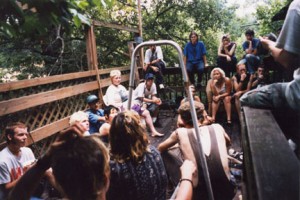 Process is the key to revolutionary change. This is not a new message. Visionaries have long pointed to this but it is a hard lesson to learn. As recently as the 70s, feminists clearly defined the lack of an alternative process for decisionmaking and group interaction as the single most important obstacle in the way of real change, both within progressive organizations and for society at large. Despite progress on many issues of concern to progressive-minded people, very little has changed in the way people treat each other, either locally or globally, and almost nothing has changed about who makes the decisions. The values of competition, which allow us to accept the idea that somebody has to lose; the structure of hierarchy, which, by definition, creates power elites; and the techniques of domination and control, which dehumanizes and alienates all parties affected by their use, are the standards of group interaction with which we were all conditioned. There are but a few models in our society which offer an alternative.
Process is the key to revolutionary change. This is not a new message. Visionaries have long pointed to this but it is a hard lesson to learn. As recently as the 70s, feminists clearly defined the lack of an alternative process for decisionmaking and group interaction as the single most important obstacle in the way of real change, both within progressive organizations and for society at large. Despite progress on many issues of concern to progressive-minded people, very little has changed in the way people treat each other, either locally or globally, and almost nothing has changed about who makes the decisions. The values of competition, which allow us to accept the idea that somebody has to lose; the structure of hierarchy, which, by definition, creates power elites; and the techniques of domination and control, which dehumanizes and alienates all parties affected by their use, are the standards of group interaction with which we were all conditioned. There are but a few models in our society which offer an alternative.
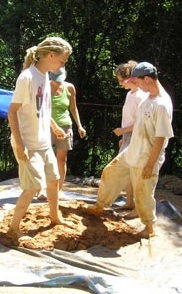 All groups, no matter what their mission or political philosophy, use some form of process to accomplish their work. Almost all groups, no matter where they fall on the social, political, and economic spectrum of society, have a hierarchical structure, accept competition as “natural”, acceptable, and even desirable, and put a good deal of effort into maintaining control of their members. It is telling that in our society, there are opposing groups, with very different perspectives and values, which have identical structures and techniques for interaction and decisionmaking. If you played a theater game in which both groups wore the same costumes and masks and spoke in gibberish rather than words, a spectator would not be able to tell them apart.
All groups, no matter what their mission or political philosophy, use some form of process to accomplish their work. Almost all groups, no matter where they fall on the social, political, and economic spectrum of society, have a hierarchical structure, accept competition as “natural”, acceptable, and even desirable, and put a good deal of effort into maintaining control of their members. It is telling that in our society, there are opposing groups, with very different perspectives and values, which have identical structures and techniques for interaction and decisionmaking. If you played a theater game in which both groups wore the same costumes and masks and spoke in gibberish rather than words, a spectator would not be able to tell them apart.
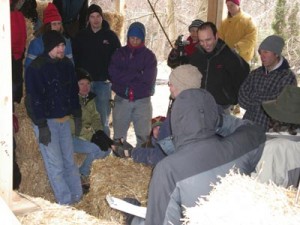 So what would an alternative revolutionary decisionmaking process look like, you ask? To begin with, a fundamental shift from competition to cooperation. This does not mean to do away with competition. Ask any team coach what the key to victory is and you will be told “cooperation within the team”. The fundamental shift is the use of competition not to win, which is just a polite way of saying to dominate, to beat, to destroy, to kill the opposition; but rather, to use competition to do or be the best. In addition, the cooperative spirit recognizes that it is not necessary to attack another’s efforts in order to do your best; in fact, the opposite is true. In most situations, helping others do their best actually increases your ability to do better. And in group interactions, the cooperative spirit actually allows the group’s best to be better than the sum of its parts.
So what would an alternative revolutionary decisionmaking process look like, you ask? To begin with, a fundamental shift from competition to cooperation. This does not mean to do away with competition. Ask any team coach what the key to victory is and you will be told “cooperation within the team”. The fundamental shift is the use of competition not to win, which is just a polite way of saying to dominate, to beat, to destroy, to kill the opposition; but rather, to use competition to do or be the best. In addition, the cooperative spirit recognizes that it is not necessary to attack another’s efforts in order to do your best; in fact, the opposite is true. In most situations, helping others do their best actually increases your ability to do better. And in group interactions, the cooperative spirit actually allows the group’s best to be better than the sum of its parts.
 Cooperation is more than “live and let live”. It is making an effort to understand another’s point of view. It is incorporating another’s perspective with your own so that a new perspective emerges. It is suspending disbelief, even if only temporarily, so you can see the gem of truth in ideas other than your own. It is a process of creativity, synthesis, and open-mindedness which leads to trust-building, better communication and understanding, and ultimately, a stronger, healthier, more successful group.
Cooperation is more than “live and let live”. It is making an effort to understand another’s point of view. It is incorporating another’s perspective with your own so that a new perspective emerges. It is suspending disbelief, even if only temporarily, so you can see the gem of truth in ideas other than your own. It is a process of creativity, synthesis, and open-mindedness which leads to trust-building, better communication and understanding, and ultimately, a stronger, healthier, more successful group.
The next step is the development of an organization which is non-hierarchical or egalitarian. A corresponding structure would include: participatory democracy, routine universal skill-building and information sharing, rotation of leadership roles, frequent evaluations, and, perhaps most importantly, equal access to power. Hierarchical structures are not, in and of themselves, the problem. But their use concentrates power at the top and, invariably, the top becomes less and less accessible to the people at the bottom, who are usually most affected by the decisions made by those at the top. Within groups (and within society itself), there becomes a power elite. In an egalitarian structure, everyone has access to power and every position of power is accountable to everyone. This does not mean that there are no leaders. But the leaders actively share skills and information. They recognize that leadership is a role empowered by the entire group, not a personal characteristic. A group in which most or all of the members can fill any of the leadership roles cannot easily be dominated, internally or externally.
The last and most visible step towards revolutionary change in group process is the manner in which members of the group interact with each other. Dominating attitudes and controlling behavior would not be tolerated. People would show respect and expect to be shown respect. Everyone would be doing their personal best to help the group reach decisions which are in the best interest of the group. There would be no posturing and taking sides. Conflicts would be seen as an opportunity for growth, expanding people’s thinking, sharing new information, and developing new solutions which include everyone’s perspectives. The group would create an environment where everyone was encouraged to participate, conflict was freely expressed, and resolutions were in the best interest of everyone involved. Indubitably, this would be revolutionary.
You can contact C.T. Butler at:
Food Not Bombs Publishing
7304 Carroll Ave #136
Takoma Park, MD 20912
website: www.consensus.net
Telephone: 1-800-569-4054
Order copies of his books, On Conflict & Consensus and Consensus for Cities on the above site. His book, Food Not Bombs: How to Feed the Hungry and Build Community, is available on Amazon.com.
Please join our Hippie Chick Diaries fan page on Facebook!
Help Spread Consensus Decision-Making Through Indymedia and the World Social Forum in Dakar, Senegal
***PRESS RELEASE***PLEASE CIRCULATE***
The opportunity of a lifetime is before me. I’m writing for support of a project to train members of media cooperatives and collectives around the world in consensus decision-making and community building.
Consensus author/trainer C.T. Lawrence Butler and I have been working with organizers to structure an event leading up to 2011’s World Social Forum in Dakar, Senegal. The event is called the Indy Media Convergence, a two-week period when members of Independent Media Center, aka Indymedia or IMC, gather to create consensus-based community and learn new skills in communication, media and journalism. Afterwards, the members remain in Dakar to cover the World Social Forum, from perspectives free of corporate interests.
 Activist C.T. Lawrence Butler is co-founder of Food Not Bombs, the international network of local organizations feeding homeless and redistributing edible food that would otherwise go to waste. Local Food Not Bombs groups operate by consensus, and C.T. has led workshops in the US, Europe and Africa, showing thousands that horizontal structure is possible. He’s the author of the definitive On Conflict and Consensus, as well as Consensus for Cities and Food Not Bombs. He has been arrested over fifty times protesting war, nuclear power and exercising his right to give away food.
Activist C.T. Lawrence Butler is co-founder of Food Not Bombs, the international network of local organizations feeding homeless and redistributing edible food that would otherwise go to waste. Local Food Not Bombs groups operate by consensus, and C.T. has led workshops in the US, Europe and Africa, showing thousands that horizontal structure is possible. He’s the author of the definitive On Conflict and Consensus, as well as Consensus for Cities and Food Not Bombs. He has been arrested over fifty times protesting war, nuclear power and exercising his right to give away food.
 I, Wren Tuatha, am a writer/filmmaker/facilitator who has lived and practiced consensus decision-making at Heathcote Community for fifteen years. I’m Artist-in-Residence there, and am currently writing a book, Consensus for Kids, based on twenty-five years in alternative education and seven years designing and facilitating Heathcote’s Open Classroom. I am a facilitator/consultant to Intentional Communities, helping established and forming communities prioritize what I call “social technologies”—consensus, conflict resolution, ZEGG Forum, etc. My website, HippieChickDiaries.com, is a first person account of life in Intentional Community, or, as I like to put it, “Wren Tuatha’s complicated adventures in simple living….”
I, Wren Tuatha, am a writer/filmmaker/facilitator who has lived and practiced consensus decision-making at Heathcote Community for fifteen years. I’m Artist-in-Residence there, and am currently writing a book, Consensus for Kids, based on twenty-five years in alternative education and seven years designing and facilitating Heathcote’s Open Classroom. I am a facilitator/consultant to Intentional Communities, helping established and forming communities prioritize what I call “social technologies”—consensus, conflict resolution, ZEGG Forum, etc. My website, HippieChickDiaries.com, is a first person account of life in Intentional Community, or, as I like to put it, “Wren Tuatha’s complicated adventures in simple living….”
 IMC is a network of collectives, established in 1999 around the anti-WTO protests in Seattle. Going to Dakar, IMC will be covering the World Social Forum, a series of events in answer to the capitalist World Economic Forum. IMC organizers are committed to members learning interpersonal communication and inclusive decision-making, as well as practical media skills, such as building radios and transmitters.
IMC is a network of collectives, established in 1999 around the anti-WTO protests in Seattle. Going to Dakar, IMC will be covering the World Social Forum, a series of events in answer to the capitalist World Economic Forum. IMC organizers are committed to members learning interpersonal communication and inclusive decision-making, as well as practical media skills, such as building radios and transmitters.
To organizers, the point is really the process. “If we don’t have consensus training, then it’s just a technical workshop,” says Sphinx, a documentary filmmaker and IMC organizer from Cameroon, now living in exile in the US. Indymedia’s mission incorporates consensus principles but many of the over 200 chapters need training.
During the 2011 Convergence, over 100 Africans, as well as members from South America, the US and Europe will experience consensus, as well as Open Space Technology, and possibly ZEGG Forum, an often emotional group process in which communities and their members view and get past some blocks that may interfere with their common work. We will also facilitate cultural sensitivity work to help the diverse community come together through understanding.
Now that our organizing structure has been adopted by the group, we need funding to make the trip. We need to raise $11000 for our consensus work in Dakar.
DESCRIPTION AMOUNT
WSF reg & on ground expenses, CT & WT 1000
airfare for CT & WT 5000
CT home expenses 1500
WT home expenses 1500
100 copies of On Conflict and Consensus 1500
emergencies & miscellaneous 500
11000
I became acquainted with GEO’s Michael Johnson through several ZEGG Forum facilitator trainings at Ganas Community. And I’m excited that he and I are beginning to collaborate in helping worker-owned cooperatives continually develop their social technology skills, so that existing horizontal structures don’t have to revert to hierarchy, and so that all members can share power and be heard in decision-making. This breeds a profound sense of community, and streamlined energy to act on and realize our dreams.
IMC organizers like Sphinx want to use the consensus community at the Convergence to inspire participants to go home and create a handful of sustained, working models of consensus in Africa.
Through my site and networking, I’ve advanced my goals of putting Intentional Community on everyone’s list of “top ten ways to go green,” and helping communities, landed, work or affinity based, to realize that social technologies—the ability to make decisions that include every member’s buy-in, skills at arriving beyond conflict by listening and understanding the other, not just delivering one’s own point—are as important to a community’s success as having the greenest building idea or innovative Permaculture garden design.
An upcoming book C.T. and I are working on develops this idea. Often people tell us that they tried consensus or saw it in action somewhere and they decided that it was too slow or didn’t really work. We agree that consensus done poorly looks just like that, and it isn’t satisfying or effective. We observe that people try to apply the basic concepts of consensus but have problems if they are neglectful or unaware of what we are coming to call the body and the soul of consensus.
When I was in film school, instructors would admonish us to learn the rules first, then feel free to break them. In the same way, consensus has a specific structure, or “body,” that should be learned, not because rules are rules, but because getting them deeply will inform your choices when you go to improvise. We see well-meaning activists who are quick to shed the saddle but then don’t know how to ride the horse.
Also, horizontal structures such as consensus are true paradigm shifts, not just changing Robert’s Rules of Order for Butler’s. Over time practitioners shed old habits, assumptions and attachments and form new curiosities, learning to trust the group. But in the meantime, consensus decision-making with members who are still trying to debate or practice old styles of leadership can be hard. We think of the paradigm shift individuals and groups go through as the “soul” of consensus.
So, as you might imagine, it is hugely important to the Dakar Indy Media Convergence that the architects of the “body” be there to help community members discover the “soul” of their community’s process.
What can you or your organization contribute? We are asking for donations totaling $11,000 to fund our travel and facilitation efforts, as well as providing students with books. We plan to blog daily from the Convergence and the WSF, as connectivity allows.
If you should wish your contribution to be tax deductible, we can work through Indymedia’s finance committee, a non-profit.
Please contact Wren Tuatha, curiocoast@comcast.net, 410-458-2310 or C.T. Butler, ctbutler@together.net, 301-586-2560 for details.
Thank you so much for partnering with us in this work that can help all groups deepen the difference they’re trying to make in the world.
Wren, Heathcote Community, November 11, 2010
C.T. Butler: Incredible Life; Indelible Stories
 C.T. Butler makes me look good. It’s my turn to cook the Heathcote Community dinner again and the consensus trainer/vegetarian chef and co-founder of Food Not Bombs is my guest and helper! Or more accurately on this day, I’m his helper.
C.T. Butler makes me look good. It’s my turn to cook the Heathcote Community dinner again and the consensus trainer/vegetarian chef and co-founder of Food Not Bombs is my guest and helper! Or more accurately on this day, I’m his helper.
Nearly all of the adult members of Heathcote take turns cooking dinners, which we share six nights a week. It comes out to cooking about twice a month. The rest of the nights, we just show up and get fed. Since we rotate, folks tend to make their specialties. So not only does someone else cook my dinner, but I get their best.
I don’t profess to have a best.
I observe with bewilderment people who savor cooking as a hobby, a joy, a vocation or avocation. I didn’t get that gene or whatever. Me, I like to eat well so I cook. I get no special creative satisfaction out of the process. Even so, since I like to eat well, I do know how to get a sparkle from my spicings.
 Cooking with C.T. is like taking a car ride with a war correspondent. We have consensed upon his traditional refried beans, a recipe that originated in El Salvador & Nicaragua. As he casually chops onions and garlic, he tries to remember the recipe from his days of feeding homeless people and protesters with Food Not Bombs. As he slices proportions down to feed the twenty or so we’re expecting, he’s reminded of arrests and police beatings and stories start to flow.
Cooking with C.T. is like taking a car ride with a war correspondent. We have consensed upon his traditional refried beans, a recipe that originated in El Salvador & Nicaragua. As he casually chops onions and garlic, he tries to remember the recipe from his days of feeding homeless people and protesters with Food Not Bombs. As he slices proportions down to feed the twenty or so we’re expecting, he’s reminded of arrests and police beatings and stories start to flow.
 Food Not Bombs just observed the thirtieth anniversary of the occupation of Seabrook Nuclear Power Plant (May 24, 1980). The six activists who would eventually rent a house together and establish the first Food Not Bombs collective, were all protesters at that event. When one of them, Brian Feigenbaum, was arrested, the others literally started holding bake sales for his defense! I’m reminded of the t-shirt/bumper sticker slogan, It will be a great day when the schools have all the money they need and the Air Force has to have a bake sale to buy a bomber.
Food Not Bombs just observed the thirtieth anniversary of the occupation of Seabrook Nuclear Power Plant (May 24, 1980). The six activists who would eventually rent a house together and establish the first Food Not Bombs collective, were all protesters at that event. When one of them, Brian Feigenbaum, was arrested, the others literally started holding bake sales for his defense! I’m reminded of the t-shirt/bumper sticker slogan, It will be a great day when the schools have all the money they need and the Air Force has to have a bake sale to buy a bomber.
Thus started a food/activism connection for the collective. “Most of us worked in restaurants at the time, cooks, waiters, etc., and we knew first hand the mountains of food that’s wasted,” C.T. explains. At first, the group collected the restaurant and grocery store leftovers hoping to feed themselves for free, liberating time and resources for their activism. But immediately they could see that they had discovered a resource far beyond their own needs. “Of course, we were activists, so our values were to see the food get used where it was needed,”
This took several forms. The collective gave food away in Harvard Square, which established the non-violent direct action template that eventually prompted clashes with police in cities around the world and arrests for serving food without a permit (although their home town of Cambridge, Massachusetts was supportive, negotiating with FNB and eventually naming C.T. Peace Commissioner). Food Not Bombs also catered demonstrations and direct actions, feeding participants so they could stay on site long hours, keeping the protests going.
Thirty years later, C.T. stands in the Heathcote Mill kitchen, mashing the pinto and black turtle beans in small batches, because we couldn’t find a masher with a long enough handle to reach the bottom of the pressure cooker. “I always say I’m mashing in the love, it looks violent but it’s made with love,” he smiles without stopping.
So many times, that sentiment has been spoken in this kitchen. I’ve heard many Heathcote members describe the act of feeding their community as one of nurturing and love. How broken and sad it seems to me that the FBI would eventually target Food Not Bombs as a “terrorist” organization. And that feeding the hungry would be viewed as a crime in dozens of cities over the globe, resulting in thousands of arrests of Food Not Bombs chapter volunteers the world over.
But right now, C.T. is feeding me and mine. As from that first Food Not Bombs collective house in Cambridge, Massachusetts, autonomous chapters operate by consensus. C.T. has written two books on consensus decision-making. And he’s had a long friendship with Heathcote through his consensus workshops. This community’s consensus on this meal is: forty thumbs up!
Palin’s pick is WAR? Please Be My Friend!
His initials spell WAR. A wonderful “online magazine in the reality-based community” called Pam’s House Blend posted about Alaska Governor Sarah Palin’s new Attorney General pick. Besides his other right wing credentials, he’s publicly used the words “immoral,” “perversion” and “degenerates” in reference to the queer community. Scary thing is, I’ll bet his mother really is proud. Unless she’s a dyke…
 As a “degenerate” on so many different levels, I’m often dismayed at the gulf that seems to divide the left and the right. But it seems that different playbooks, different assumptions drive each. Cultural liberals want to let folks be, we’re comfortable with a range of behaviors, as long as our own personal choice is intact. We can allow that contradictory ideas can both be true and that the different ways our neighbors live are enriching for our children. Cultural conservatives like structure and having things defined in absolutes. I guess then you don’t have to wonder if you’re right or if ideas need updating. They’re absolute. The Bible is a favorite source for absolutes. Strangely, my liberal Christian friends have the same book with the same words in the same order. But their book says very different things…
As a “degenerate” on so many different levels, I’m often dismayed at the gulf that seems to divide the left and the right. But it seems that different playbooks, different assumptions drive each. Cultural liberals want to let folks be, we’re comfortable with a range of behaviors, as long as our own personal choice is intact. We can allow that contradictory ideas can both be true and that the different ways our neighbors live are enriching for our children. Cultural conservatives like structure and having things defined in absolutes. I guess then you don’t have to wonder if you’re right or if ideas need updating. They’re absolute. The Bible is a favorite source for absolutes. Strangely, my liberal Christian friends have the same book with the same words in the same order. But their book says very different things…
 On facebook, fundamentalists and liberal activists play this out. After the Pope’s remarks that condom distribution only makes the AIDS epidemic in Africa worse, one woman wrote about handing out condoms on her campus. A “friend” shot back that, if everyone would just follow God’s law there would be no homosexuality. After a few exchanges it turns out that his logic was this: Homosexuality may or may not be hardwired for some people. But since “God’s law” is no sex before marriage, and gays can’t marry, well then no homosexuality…
On facebook, fundamentalists and liberal activists play this out. After the Pope’s remarks that condom distribution only makes the AIDS epidemic in Africa worse, one woman wrote about handing out condoms on her campus. A “friend” shot back that, if everyone would just follow God’s law there would be no homosexuality. After a few exchanges it turns out that his logic was this: Homosexuality may or may not be hardwired for some people. But since “God’s law” is no sex before marriage, and gays can’t marry, well then no homosexuality…
Problem with his plan is, I follow “the goddess’ law.” Sex is sacred…and our gulf remains.
As long as we keep talking past each other over the gulf, every political battle just feels like another in a constant barrage of skirmishes, some lost, some won on a battlefield where the majority rules. I support that fight, but I feel empty that virtually everybody goes home with the same ideas they came with.
 My mother, left (literally), is a political science major, a political animal. I have always been called to activism, but as a marcher, not a lobbyist or pundit. I am not a political animal, probably because I’m too emotional. Someone starts arguing me down and I just want to hug them or defect to a warmer climate. My vehicle for change has always been personal action, living by example, networking to transmit my ideas and culture, witnessing for justice and my beliefs as situations arise.
My mother, left (literally), is a political science major, a political animal. I have always been called to activism, but as a marcher, not a lobbyist or pundit. I am not a political animal, probably because I’m too emotional. Someone starts arguing me down and I just want to hug them or defect to a warmer climate. My vehicle for change has always been personal action, living by example, networking to transmit my ideas and culture, witnessing for justice and my beliefs as situations arise.
To me, not going shopping is a radical act of social justice.
So is there a way to bring the country closer together? (Note to the Invisible Forces of the Universe: I’m not asking for another 9/11 or Katrina here. I’m asking people what people can do. Butt out. We’ll handle this.)
A friend who’s a sex therapist brought SAR to my attention: Sexual Attitude Reassessment. I’m interested in this sort of thing on a grassroots or cultural level. But I’ll probably start by trying it within Intentional Communities, those wonderful laboratories of cultural change. Play, play, play!
Pope Condom Attack–There’s a Greener Way!
 P.S. The links keep coming in. Thanks, facebook & gaia.com friends! I’ll sort through them and try to contact the orgs, to see 1) if they want condoms mass mailed to them, and 2) if there’s support that’s more relevant to them. I’ll post the results ASAP!
P.S. The links keep coming in. Thanks, facebook & gaia.com friends! I’ll sort through them and try to contact the orgs, to see 1) if they want condoms mass mailed to them, and 2) if there’s support that’s more relevant to them. I’ll post the results ASAP!
People, people people. Dude thinks he has The One True God talking in his ear. He’s got no need to back down on anything he says. I assume we all know the action of sending millions of condoms to the Pope is to raise awareness among people who are not the Pope.
Given that, although the gimmick of mailing condoms to the Pope and asking him to distribute them in Africa is dramatic, is it worth the environmental impact of those millions of condoms being produced, shipped, wholesaled, shipped, bought, mailed, received and thrown into an Italian landfill?
 I recall about twenty years ago, back in Louisville, Kentucky, when an Alderman reversed his position, deciding not to support adding “sexual orientation” to the city’s list of classes protected from discrimination in employment, housing and public accommodation. We activists and supporters of the local Fairness campaign sent the alderman actual flip flops. It got a lot of press. His office was inundated with beach footwear.The alderman didn’t flip his position back again for several years. But our point was made to the city of Louisville.
I recall about twenty years ago, back in Louisville, Kentucky, when an Alderman reversed his position, deciding not to support adding “sexual orientation” to the city’s list of classes protected from discrimination in employment, housing and public accommodation. We activists and supporters of the local Fairness campaign sent the alderman actual flip flops. It got a lot of press. His office was inundated with beach footwear.The alderman didn’t flip his position back again for several years. But our point was made to the city of Louisville.
 Now, a prickly difference here is that we weren’t sending flip flops to a public figure who was opposed to the wearing of shoes. I assume that his staff carted them off to Goodwill, the Salvation Army, the Home of the Innocents, and whoever would use them. I bet that Alderman still has a few pair saved in his own size. All in good activist fun.
Now, a prickly difference here is that we weren’t sending flip flops to a public figure who was opposed to the wearing of shoes. I assume that his staff carted them off to Goodwill, the Salvation Army, the Home of the Innocents, and whoever would use them. I bet that Alderman still has a few pair saved in his own size. All in good activist fun.
We know theater. But we can be dramatic and actually impactful at the same time.
I propose that we identify organizations already distributing condoms and mail our Pope prophylactics to the saints who will actually hand them out! We can send them in His Holiness’ name. And we can suggest that, if any condoms should fail, resulting in pregnancy, the child should be named Benedict…or Benedictine, if it’s a girl. Being from Kentucky, I love Benedictine. Kentucky is the state of fattening spreads–Benedictine, pimento cheese, beer cheese…Sorry, off topic!
I’m putting out some feelers to identify organizations that distribute condoms in Africa, for a start. Write me if you know of them. My guess is that money is tight for such groups and they would thank the Pope’s One True God if she would, through us, send them the condoms they need!
Or maybe they’re sitting on warehouses of donated condoms already and need some other distribution support. Can we wait a couple of news cycles and find out what is of most help?
It occurs to me that staging the activism on a bottom-up level might actually have an impact on the policies of the Catholic Church long term. What about mailing a condom to your local priest or bishop? Some of them are the future leadership of the Church, people who may be in a position to make directional shifts in the future, which are not likely for a standing Pope. A few pragmatic local priests might actually send the condoms to their local health clinic or Planned Parenthood under the table, and those could do more good before the landfill…
I’m Unitarian-Universalist and Pagan. So I imagine I have very simplified ideas about the Pope, the Catholic Church, the Vatican, and also the AIDS crisis in Africa, which I only know from the headlines, not the trenches. But I have been in the trenches of the green and simplicity movements for decades. I know how to screen for my impact in the choices I make as a consumer, an educator, an activist, an animal living on the planet. So it’s my knowledge that is sending up alarms, and sending me into brainstorming on topics out of my area. But that’s the wonderful thing about this internet: Some of you have the pieces I’m missing.
The following links were suggested by facebookers, members of the various groups that formed around the call to send the Pope condoms:
- http://www.avert.org/ I had previously found this group on my own first google search. I emailed them to ask if they were an organization who could accept and distribute donated condoms. They wrote back to say that, sadly, this is not their gig. But they gave me a list of about 10 NGO’s to contact. I’ll keep you posted.
- http://www.avaaz.org/en/pope_benedict_petition/ a gaia.com friend sent me this Avert.org link to their related petition. Thanks!!!
- http://www.nazarethhousejohennesburg.org/ I visited this site when the link was posted and emailed them as well. Another group member asked the question on my mind–Being a religious charity, do they evangelize, or make religious requirements of the people they serve? The poster of the link implied that they don’t. But the site didn’t mention the issue, so I asked in my email. I tried to be respectful. I hope it doesn’t prevent me from getting a response. The pros and cons of this issue could be their own post. But for those of us outside of organized or mainstream religion, it’s important for our giving to be without strings attached.
- http://www.mariestopes.org.uk/Home.aspx “Marie Stopes International is one of the major distributors of male and female condoms,” according to Kara Hanas, my facebook friend in Oklahoma. She posted this link to their Wikipedia article, describing their “social marketing programmes” in 17 developing countries.
- http://guttmacher.org/ Kara suggests this site “in regards to AIDS statistics, unsafe abortion, and contraceptive use in Africa.”
She adds, “I have written many a paper over abortion and contraceptive use so if you have any questions please let me know. The argument is best made if stats are looked at as primary indicator rather than ethics of such a practice. Maybe look into the Rape Condom as well, its chilling. Also Botswana I believe is a stable democracy (freedom house indicators) and has been since the 60s; however, something like 60% or 65% of their population is infected with the virus. Look that up because I can’t remember off hand the number of HIV cases and AIDS cases. Lancet has some really good articles as well over contraceptive use and unsafe abortion…”
Clearly Kara has a wealth of research to share. Unfortunately for this posting, she’s under tons of snow and without internet to send me the links and research she and I discussed. I’ll follow up with those. Hmm. I wonder if, nine months from now, Oklahoma will see a boom of snowstorm babies. Maybe Kara is busy going door to door with her tin of condoms!
As always, I’d love to get your comments, on Hippie Chick Diaries, on facebook, or on my favorite green/alternative/activist networking site, gaia.com!

